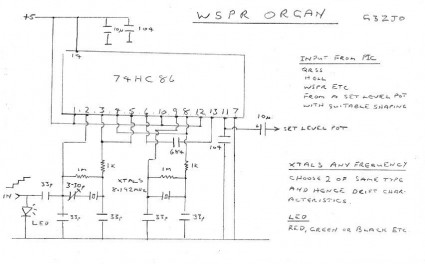Some interesting new (to me) radio techniques…
The Knightsqrss mailing list still intrigues me, although my own qrss beacon has been off the air for a while (I’m trying to get around to homebrewing its replacement, but have been distracted by other facets of life for a while). Recently, Eddie G3ZJO offered this rather interesting circuit which I scratched my head about for a while:
This “WSPR-ORGAN” is an interesting idea. It uses a 74HC86 Quad Exclusive NOR gate in a clever way. Two of the gates are configured as oscillators/inverters fed by a pair of identical crystals, one running with a fixed capacitance, the other with some capacitance switched in via a control signal. The output of these two oscillators is fed in to a third XNOR gate which serves as a mixer, producing sum and differences of the two signals. Eddie is interested in the difference, which is small (in the audible range) and which has little drift, since the two oscillators will likely have identical drift characteristics which will cancel out when using the signal to get the difference signal. What we essentially have is a very precise voltage controlled oscillator which puts out a signal in the audio range. Pretty neat.
The resulting discussion on the Knights was similarly interesting, and lead me to a series of interesting web pages. I hadn’t seen the 74HC86 used in this application before, but a little quick Googling lead me to Ian, VK3KRI’s page on using the 74HC86 as a crystal synthesizer. A diversion into the world of “subharmonic” mixers yielded a link to this interesting receiver design for QRSS which uses a common 5.0688Mhz oscillator which is tricked to operate at twice the frequency to provide good reception around the QRSS watering hole at 10.140Mhz. This page also links to LA8AK’s page which explains some of the interesting mixer ideas. Too much for me to absorb before coffee, but all cool stuff.
Addendum: Checking the prices of Digikey reveals that 5.0688Mhz crystals are in fact a very common item, and can be had for about $.40 a piece. Frankly, the 10.140 Mhz crystals offered by Expanded Spectrum Systems aren’t exactly burdensome, but it’s interesting to see other designs which make use of even more common crystal frequencies.

I recall burning three or four weeks of a sabbatical getting Saccade.com on the air with Wordpress. So much tweaking…